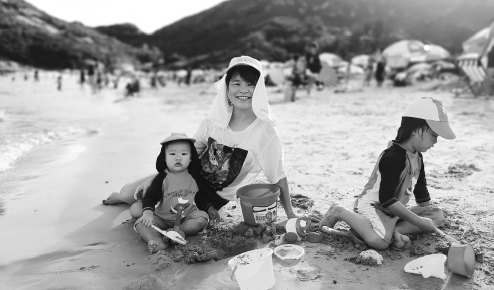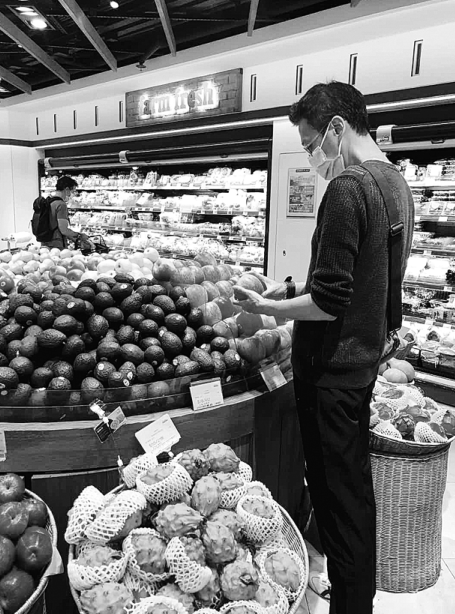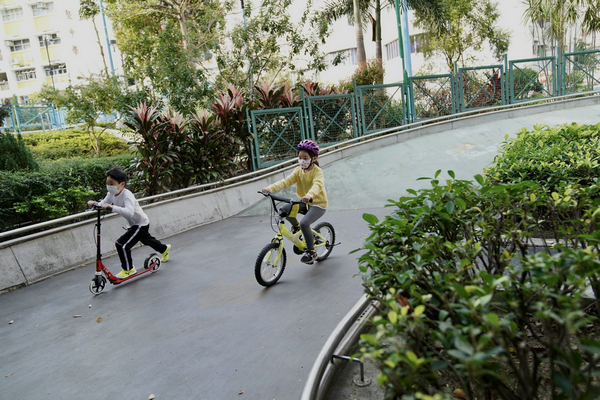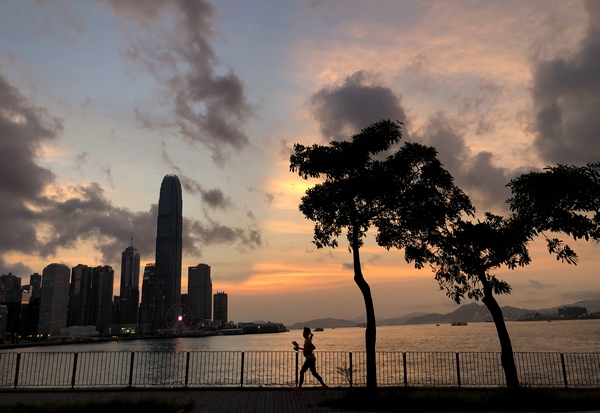COVID-19, the reawakening to simpler ways

Candy Tang spends a day with her children at Repulse Bay in Hong Kong. Tang said the COVID-19 pandemic brought her back closer to her family. (Photo provided to China Daily)
BEIJING — There’s a boogeyman loose in the world, and as it spreads fear around the globe, people are finding that things they once considered important don’t seem to be so anymore. As COVID-19 claims more and more victims, people are giving up embellishments and vanities that once occupied their attention and are turning to the basics: food, shelter and security.
Take the case of Queenie Gong, a high-power insurance company executive and fashionista. If you wanted to know if sparkle was still the rage, or if fuchsia minis and pink fedora punk tops were in and where the hemline index sat at the moment, Gong was your source. She’d blow HK$30,000 ($3,871) a month on designer clothes.
But that was before COVID-19 turned the world a “little more real”.
“The pandemic transformed me,” says Gong. “I was shocked to find how vulnerable life is in front of the disease. The luxuries we put on give us only ostensible glamor, satisfying our vanity. But when disease comes our way, glamor becomes nothing.”
She’s cut her luxury spending a full two-thirds and says these days, she shops for value. “My appetite for fashion has dulled. Now I love ‘basic, natural and sustainable’, and things that are timeless and comfortable”, says Gong. “I’ve really changed a lot.”
Article continues after this advertisementGong’s elevated sense of fashion has been replaced by elevated anxiety. Where is all this going? The virus is on her mind constantly. “I have to acknowledge there’re too many uncertainties this time around. Nobody knows when this will end. The heartfelt insecurity urges me to reflect on my ways of consumption. ‘Is there any point in being pretentious, if I don’t have much disposable income?’, I ask myself,” laments Gong.
Article continues after this advertisementGong has awakened to a new reality, showing her that good health is her best investment.
Next, Linus Yip, another high-power executive. The pandemic changed his life, awakening him to the pleasure of grocery shopping. He decided it wasn’t right for the family maid to take all the risk of going to the wet markets to shop. Yip, chief strategist at First Shanghai Securities, posted a picture of himself on WeChat-Tencent’s instant messaging app-holding a bag bulging with meat and vegetables.
“It was my first time, as far as I remember, to buy food at the wet market alone. It was fun. I didn’t even know grocery shopping was an important part of life, until now. Thank you, my family, for what you’ve done.”
Life was all about work before the pandemic, Yip says. His wife and their maid did all the work in the home. “The only thing I needed to take care of was to be focused on my work.
“Before, I was well-fed. Now, I feed the family,” laughs Yip. “The feeling is amazing. The knowledge that I can make contributions to the family other than earning money is so reassuring.” COVID-19 made Yip see that work is not everything in life. He’s grateful to have the free time that allows him to “return to his family”.

Linus Yip buys fruits and vegetables for his family in a supermarket in Hong Kong. He also came to realize that simple things in life like shopping for groceries can be enriching. (Photo provided to China Daily)
Candy Tang, a successful entrepreneur and mother of two, has hunkered down at home for months since her projects came to a dead stop, but she has found new value in a deeper bond with those who she calls her two little angels.
“I bustled around all day, before the pandemic,” says Tang. “The pandemic upends and quiets my life, but on the other hand, it has made me realize what I’d missed of my kids’ growing up.”
She asked her older son Kosmo, “Why do people have to stay at home?” She didn’t expect an articulate answer from the 5-year-old. He said, “Because bats have a virus. Pigs eat bats’ feces and get sick. Then, we eat pigs. We get sick.”
“His answer wowed me,” recalls Tang. “I never expected he learned so much from school, could remember it, and articulate it that way. He has grown so fast.”
She took her family out to Repulse Bay weeks ago. Seeing rubbish floating on the water, Tang says, Kosmo waded into the water, gathering the refuse and “lecturing” about how garbage damaged sea life and the planet.
“I was amazed by my precious son’s sensibility and decisiveness. I was touched and motivated to join him,” says Tang. “As an adult, we may do nothing because we think that one person’s effort won’t make any difference to the environment. But the child’s world is black and white. It’s pure and simple.”
The child’s world is like a mirror, reflecting how simple life can be, says Tang, in retrospect. “The pandemic is unprecedented. At the same time, it’s my first time to realize that life is about doing subtraction … subtracting the complexity, ambiguity and negativities.”
The pandemic, if ever it ends, will leave indelible marks. In times of crisis, people turn to the simpler things in life. Many of the changes will be permanent, experts say. Gong abandoned her tastes for the latest fashions, reflecting possible changes in how the world will do business in the future.
Changes in fashion
Fashion is the spirit of the times, says Katalin Medvedev, an international dress and fashion scholar from the University of Georgia.
“Fashion mirrors what’s going on,” she says. “People now need comfort the most… anything that is simple, predictable and consoling.
“Hard times have always changed people’s attitudes to fashion. This was the case during the Great Depression when consumption slowed down, or during World War II when people started to make do and mend. In the last recession people started to buy safe things, timeless and durable pieces,” reflects Medvedev.
Charles Benight, a psychology professor at the University of Colorado, is a specialist studying how people recover from disasters. Coronavirus brings the kind of uncertainty and ambiguity that feeds fear and anxiety, he notes. Human resilience comes from the senses-we see, smell, hear and feel, to gauge what’s happening, says Benight.
“Until we figure out a long-term way to manage the crisis, some people will be more on edge and more vigilant. Their behavior will change, concentrating on keeping one’s family and oneself safe.”
When calamity strikes, people get back to life’s basics, the things that are really important. The closure of businesses affecting millions, the sudden loss of a job or income, and the trauma of knowing the virus is still out there haunt people. People don’t know when, or if, life will return to “normal”.
There are varied definitions of “self” in different contexts, says Chen Zhansheng, associate professor of psychology at the University of Hong Kong. Everyone has a different “self”-as an individual, as a family member, and when we network under social circumstances.
“But with the social distancing, the third ‘self’ becomes less relevant. Then, we naturally dedicate more time and energy to the first two selves,” explains Chen.
As we reallocate our attention to our inner self and family, we will ask ourselves, “who am I”, and “what role do I play”, says Chen, adding that these are the most basic questions we seek to answer in life.
When a crisis sets in, our instinct prompts us to find a shelter, in order to restore a sense of safety and emotional balance, notes Chen.
“That’s a built-in coping mechanism,” he says. “At this point, we tend to identify ourselves and our family as the safest shelters, or ‘nest’ or ‘den’ as we call it. It offers a break space for us to get away from the threatening situation.”
Yip also finds himself “returning to basics”.
While Yip says he would meditate on life before the pandemic, “It’s the pandemic that reinforced my perception that life is simple and doesn’t have to be opulent. The pandemic brings some basics in life back to the surface. It motivates me to get rid of some complexities, to collect my thoughts and to embrace simplicity.”
Lifestyle change also manifests in people’s travel patterns.
Public spaces in need
Traveling abroad is inaccessible due to COVID-related restrictions, which is a nuisance for many, but Hong Kong people have rolled with it. They are returning to nature. During weekends since the restrictions were imposed, hiking tracks, fishing villages and beaches on the outskirts of Hong Kong have received more local visitors.
“Outdoor exercise has been part of daily routine for many locals. It’s just that in the time of lockdown and work-from-home, people’s need for an outdoor break gets stronger,” says Samuel Wong, project officer of Designing Hong Kong. Shared public spaces are a vital part of the city fabric. “As a gathering spot for family and friends, public areas offer not only a physical space, but a welcome sense of togetherness and community.” Especially in this trying time, Wong notes, people need the getaway to relieve stress and anxiety.
Non-essential travel is banned and likely will stay that way for a while. In Hong Kong, people aren’t going to give up having fun but they are almost certain to demand more public spaces, reckons Wong.
Many residential buildings have rooftops. They can become gathering places. In the Netherlands, he says, rooftops of several residential buildings are linked to form a big recreation area. They’re open to people from the community to mingle, swig beer, play music and do what feels like fun.
“In some old districts in Hong Kong, like Kowloon City, buildings are in close proximity and low-rise, which makes it feasible to construct an expansive rooftop across the buildings,” says Wong.
“We need to look for chances to provide more breathing spaces in this highly dense city to meet the growing demand for outdoor spaces,” says Hendrik Tieben, an associate professor of architecture at the Chinese University of Hong Kong. People are latching onto the fact that tourism pleasure does not have to derive from a long-haul or cross-continent travel, he says.
“There will be an attitude toward other forms of simple pleasures. People will likely turn to appreciate places close by, locally.” He suggests pedestrianizing secondary roads that are not frequently used by vehicles, at least part of the day, or widening the sidewalks.
The pandemic is catapulting life into a space where value has meaning. It’s a time that helps to awaken people to a clearer notion of “self”. We are not our jobs, not the cars we drive, not how much money we make. As life has slowed down, there are rewards for cutting ourselves some slack and learning to appreciate once more the beauty of the things that have real meaning, but may have become lost, in the frenetic rush to “success and self-actualization”.
For more news about the novel coronavirus click here.
What you need to know about Coronavirus.
For more information on COVID-19, call the DOH Hotline: (02) 86517800 local 1149/1150.
The Inquirer Foundation supports our healthcare frontliners and is still accepting cash donations to be deposited at Banco de Oro (BDO) current account #007960018860 or donate through PayMaya using this link.

